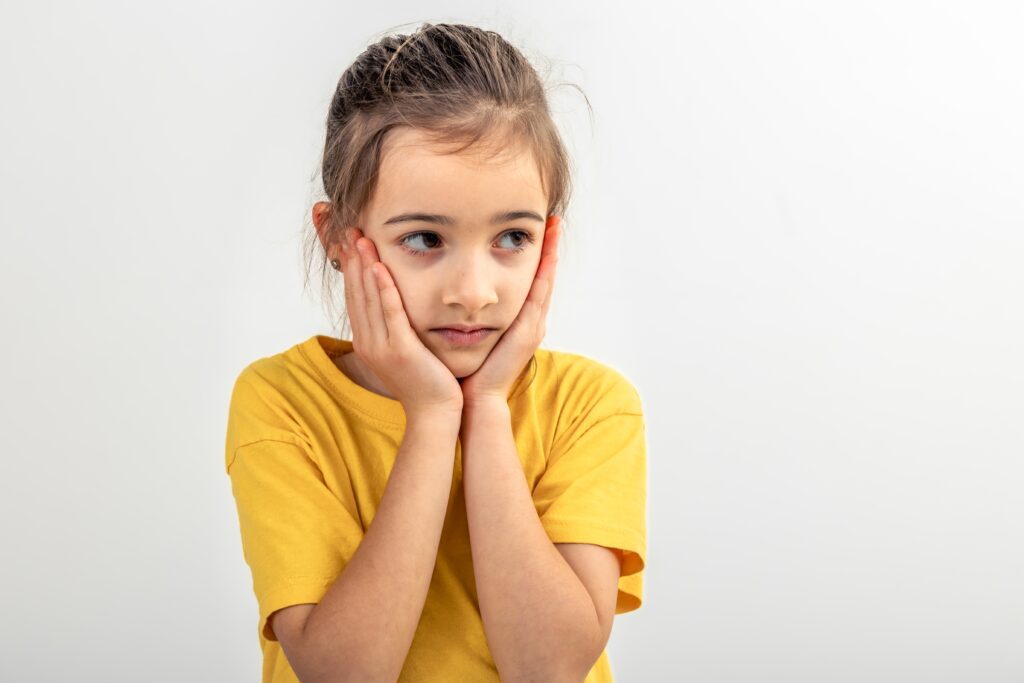
Blog
Can TMJ Issues Start in Childhood? Early Symptoms to Watch For
Author: DrSensory
June 19, 2025
Can TMJ Issues Start in Childhood? Early Symptoms to Watch For
TMJ disorders are often seen as an adult issue—but yes, children can experience TMJ problems too. The temporomandibular joint (TMJ) is what allows your child to chew, speak, and yawn. If it’s not functioning correctly, it can lead to pain, limited mobility, and future orthodontic issues.
In this blog, we’ll explain:
Common TMJ symptoms in children
Why growing jaws can trigger jaw pain or clenching
When to see a dentist or specialist for early treatment
The Link Between Tongue Posture and Jaw Development in Kids

What Is the TMJ—and Why It Matters in Kids
The temporomandibular joint (TMJ) is the hinge that connects the jawbone to the skull, and it’s in constant use—especially during childhood as the face and jaw are still developing.
TMJ disorders (TMD) can interfere with:
Chewing and biting
Proper jaw growth
Comfortable speech and facial movement
Early diagnosis and care are critical for preventing long-term dental or developmental complications.
How Dental Alignment Affects Chewing and Swallowing in Children
Clicking, Clenching, and Growing Jaws: Signs of TMJ Issues in Kids
Children may not always verbalize pain clearly, but there are physical and behavioral signs to watch for. TMJ dysfunction in kids often shows up through:
1. Clicking or Popping Sounds
Clicking noises when opening/closing the mouth
Popping that accompanies wide yawns or chewing
May signal joint misalignment or cartilage dysfunction
2. Jaw Clenching or Teeth Grinding (Bruxism)
Often happens at night or during stress
May result in headaches, worn-down teeth, or facial tension
Affects both the TMJ and surrounding muscles
3. Jaw Pain or Tenderness
Localized pain in the jaw joint or around the ears
Complaints of aching while eating or talking
May radiate to the neck or shoulders
4. Difficulty Chewing or Avoidance of Hard Foods
Kids might refuse certain textures or say chewing “hurts”
May chew more on one side or shift their bite
Indicates functional strain on the joint
Dental Signs of Sensory Processing Differences in Children
Delayed Speech in Children: Causes, Signs, and Therapy Options
When to Intervene: Don’t Ignore Early TMJ Symptoms
If your child is experiencing these symptoms regularly, it’s time to seek professional evaluation. Early intervention is crucial to avoid more serious complications like:
Joint damage
Irregular jaw growth
Long-term bite problems
A pediatric dentist or orthodontist can perform a thorough exam and recommend age-appropriate treatment.
How Dental Alignment Affects Chewing and Swallowing in Children
The Importance of Brushing Teeth Starting at a Very Young Age
Pediatric Treatment Options for TMJ Dysfunction
1. Custom Mouthguards or Splints
Protect your child’s teeth and reduce jaw tension from clenching or grinding—especially during sleep.
2. TMJ Physical Therapy & Exercises
Guided stretching and strengthening exercises can reduce joint pain and improve mobility.
3. Orthodontic Solutions
If bite misalignment or jaw positioning is contributing to TMJ symptoms, early orthodontic intervention (e.g., braces or aligners) can help guide proper growth.
4. Stress Management Support
TMJ issues may be worsened by anxiety or stress. Techniques like breathing exercises or sensory calming routines can reduce nighttime clenching.
TMJ Can Start Young—Early Help Matters
If your child shows signs of jaw pain, clicking, or clenching, don’t wait to act. TMJ issues in children are real and can worsen without early intervention.
With the right care from a pediatric dentist, orthodontist, or physical therapist, your child’s jaw can develop properly—pain-free and fully functional.
Apraxia of Speech in Children: Signs, Diagnosis & Therapy
Baby Teeth and Speech Development: How Are They Connected?
Typical Milestones in Speech and Language Development for Birth to Seven

🔍 Frequently Asked Questions (FAQ) TMJ in Children
❓ Can TMJ go away on its own in kids?
Mild cases may resolve with growth or behavior changes, but persistent symptoms should always be evaluated by a dental professional.
❓ Is teeth grinding always a sign of TMJ?
Not always—but it can put pressure on the TMJ and lead to dysfunction over time. A mouthguard may help prevent further damage.
❓ Can chewing gum make TMJ worse?
Yes. Frequent gum chewing can overwork the jaw muscles and worsen TMJ symptoms, especially during flare-ups.
related blogs
Your child is constantly moving, crashing into furniture, or having meltdowns in response to seemingly minor things like a loud
Your toddler refuses to wear certain clothes, has huge meltdowns in noisy places, or is an extremely picky eater, limited
Your child seems to miss verbal instructions, struggles to follow conversations in noisy environments, and often asks "what?" even when
On the surface, autism and Ehlers-Danlos syndrome (EDS) might seem like two entirely unrelated conditions. One is a neurodevelopmental condition
The intense head pain begins, lights feel blindingly bright, and every sound seems amplified to an unbearable level. You retreat











































































